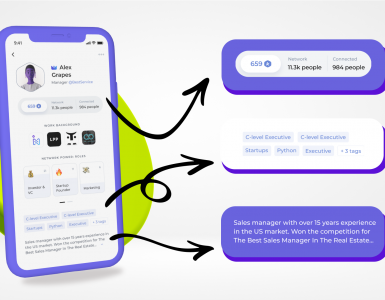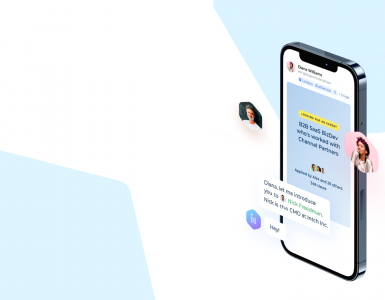Finding a co-founder is one of the most important decisions you will make for your startup. Not only does it influence your equity, but it also determines the success or failure of your company.
As reported by Crunchbase, nearly one-quarter of startups fail due to a poor founding team. Moreover, on average, startups with two founders get 30% more investment and three times the customer growth rate. While there are highly successful businesses with a solo founder—eBay being a notable example—these are in the minority.
All that said, finding the right co-founder is far from easy. It requires knowledge and experience, but also a high level of intuition. It’s no surprise then that finding the right co-founder is a major challenge.
The good news is that there are steps you can take to ensure you find your perfect match. Here’s what you need to know about finding a co-founder and how it all works.
How do I find my co-founder?
The first thing you need to do is decide what you’re looking for. Is it someone who shares similar values? Someone with whom you have natural chemistry? Or are you after specific skills or expertise? The answers to these questions will inform your search.
The second step is to understand your options. The key here is building authentic connections, and much like dating, many (if not most) co-founders now meet online. Prior to modern networking apps, some co-founders met from Craigslist to Facebook, but today, there are better options.
We’ve all heard of LinkedIn—the world’s largest professional networking site. But that achievement is a double-edged sword. With nearly a billion users, the purpose of LinkedIn has become blurred:
- Is it a platform for networking? Then why is it all political news and personal stories?
- Is it a platform for valuable content? Then why is everyone fishing for likes?
- Is it a platform to find the top talent? Then why aren’t top positions filled on LinkedIn?
Indeed, one viral Hacker Noon article described LinkedIn as a “pointless world.” The big problem is that a co-founder search on LinkedIn would be unfocused, diluted, and get derailed by distractions, as, more often than not, it comes across as just another Facebook or Twitter-style social entertainment platform.
There are other options, namely: Intch, a professional networking app that finds win-win connections for you. Using AI, Intch highlights how potential connections are relevant, and by helping them, you gain “social capital,” which you can use to further build a curated network.
After finding potential co-founders, it’s time to really analyze the potential relationship.
Interviewing
Interviewing is the most effective way to narrow down your search. So what does an ideal interview look like? A good rule of thumb is that it should be fairly spontaneous and introductory calls shouldn’t last very long, since you’ll otherwise end up taking a lot of time from people you’ll never collaborate with.
Therefore, you’ll want to focus on getting to know them as much as you can in that short time frame – their background, what they do best and worst, their interests outside of work, and so on – so that you can determine whether you would get along well together.
It’s important to figure out a number of things early on, including:
- Who’s ultimately in charge (Who’s the CEO or lead decision-maker? Where does the buck stop?)
- How much salary does each co-founder need?
- Are there any extenuating life circumstances?
- Can both parties go all-in for years?
- What’s the equity split? If not 50/50, why not?
- What’s the exit strategy? (M&A, IPO, or operate in perpetuity?)
Answering these questions gives you a better idea of whether or not this is the right fit. These are a lot of questions to ask, but it’s important to prioritize and focus on what matters most.
What does it mean to be an equal partner?
An equal stake is when both founders each own 50% of the business; there’s no hierarchy or bias towards one founder being “more important” than another founder, because each founder owns an equal share of the business.
This isn’t always possible though: You might have one founder that wants to hold the role of CEO while one founder wants to take on more responsibilities early on, such as marketing lead and business development lead.
In most cases though, it makes sense for both founders to operate with an equal stake so that neither feels like they are carrying more weight than the other founder. For example, if one co-founder was responsible for building out new product lines while another was responsible for customer support and growth marketing channels, then having both founders operate with an equal stake ensures parity across areas of responsibility.
It also ensures that neither founder feels like they are making all of the important decisions and instead feel valued as equally valuable members of the team.
What if I can’t find a co-founder?
If you can’t find a co-founder, then that’s OK. It’s not the end of the world. You’ll have to figure out how you’re going to run your startup on your own, at least for now.
After all, the original “spark” for a startup idea usually comes from one person, who sooner or later may share that idea with someone who becomes their co-founder.
There are plenty of successful companies that were founded by one founder: Amazon, eBay, Ford, and more. Like any other business venture though, building something from scratch requires hard work and dedication from everyone involved-not just one person.
What if my co-founder quits?
This is a common question for new entrepreneurs, and it’s one that has an obvious answer: find another co-founder. If your current co-founder leaves, then you’ll have to go through the entire process again. This time, though, you won’t be starting from square one.
The good news is that a co-founder quitting isn’t always the end of the road. Famously, both Instagram co-founders quit. Today, Instagram is estimated to be worth over $100 billion. Meanwhile, the Uber co-founder was removed, while Uber is worth around $80 billion today.
And it’s not always voluntary: Sometimes the board deems it necessary to fire a founder or co-founder, as was the case with Apple and Steve Jobs. Of course, that decision changed, and Apple recently became the first $2 trillion American company.
Takeaways
Ultimately, finding the right co-founder can be a make-or-break decision for your startup.
Many businesses have failed due to incompatible founders, while others have become wild successes due to having synergistic power duos at the helm. With Intch, it’s easier than ever to find the right co-founder, via a laser-focused social networking platform that finds relevant contacts for you.






Love the criticism of LinkedIn. Its purpose has really become so murky. Intch seems a lot more straightforward.
Interesting that he says introductory calls shouldn’t last long. I always thought introductions should be as thorough as possible but I see the point here. You just want to get a feel for what someone is like and keep moving.
Wow, I didn’t know that both Instagram co-founders quit! That really shows that these kinds of obstacles are not the end of the road for a company.